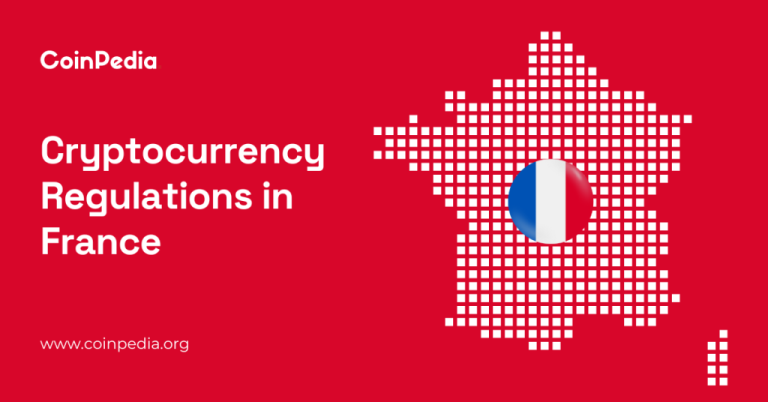The post Crypto Regulations in France 2025 appeared first on Coinpedia Fintech News
Since the PACTE Law was passed in 2019, crypto trading and owning have become legal in France. After establishing a legal framework for cryptocurrency, France introduced new and stricter laws to regulate it within the country. As of 2025, France has emerged as one of the crypto-friendly countries in Europe because of its strong tech ecosystem and clear regulatory framework.
Table of contents
Crypto Regulations in 2025
2025- MiCA Regulations
- It has established a unified regulatory framework for crypto assets to address risks of financial instability and consumer exploitation.
- The Autorité des Marches Financiers (AMF), a financial regulatory body, is required to conduct supervisory reviews, spot checks, and investigations to confirm that MiCA rules are thoroughly complied with.
- It oversees exchanges, custodians, and wallet providers. It also regulated Asset Referenced Tokens (ART), a type of stablecoin backed by fiat currencies or commodities.
July 2025- Application of AMLA
- The creation of a new anti-money laundering authority (AMLA) and CFT compliance has been in force since 2024, and it will enter into application in July 2025.
- It contains detailed guidelines with customer due diligence to prevent any crypto-related risks.
May 2, 2025- DDADUE Law
- It introduces a legal framework for pleading crypto assets through the Financial Code, in which rules are inspired by the security regime.
- Under this law, CASPs are required to obtain a certificate of pledge from MICA.
- Crypto assets are required to be formalized through a signed declaration by the asset owner to mitigate third-party risks.
January 2025- Transfer Fund Regulation
- TRF has been in force since 2023 and was fully applied in January 2025 to mandate crypto transfers.
- It ensures that the transfer of crypto assets exceeding EUR 1,000 between a CASP and a self-hosted wallet is subject to reporting requirements
December 30, 2024- June 30, 2026- MiCA Authorization
- In the 18-month transitional period, existing crypto asset providers (CASPs) can continue operating under their current national regulations while they transition to the new Market in Crypto Asset Regulation (MiCA).
What Does the French Government Say About Crypto?
The primary regulatory body of crypto, Autorité des Marches Financiers (AMF), began to support the Saving and Investment Union Project, which started with a cross-border crypto asset platform.
Earlier this year, in March, the French State Bank Bpifrance planned a $27 million crypto fund investment in digital assets. This approach of competitiveness in the field of digital assets was supported by the French federal government as well.
Additionally, the French Interior Minister Bruno Retailleau announced that he would meet crypto professionals to enhance security while addressing the risks. The French government is currently accelerating transparency in crypto transactions, financial stability, and consumer protection through MiCA.
Crypto Tax in France 2025
In France, crypto is treated as general stocks, bonds, and other capital assets, which makes it taxable. All taxes are mandated by the General Directorate of Public Finances (DGFiP).
- Tax-free events: Exchange or swapping of crypto assets, gifting crypto assets, ICOs and IEOs, Airdrops, DeFi, margin trading, and NFTs.
- Tax reporting: Income tax for 2025 will be due on April 10th for the 2024 fiscal year.
| Category | Tax rate | Tax basis | Details |
| Occasional investors | 30% pfu | Capital gains (crypto to fiat) | Crypto-to-crypto trades are tax-free |
| Professional traders | 0- 45% (non-commercial profit- BIC) | Net profits | Professional trading activity |
| Mining | Up to 45% BNC | Net profits | Micro BNC regime available for small miners |
| Capital gains from crypto | If gains exceed 305€ per year | Converted into fiat currency | (DGFiP) |
Crypto License in France
- As of 2025, all crypto asset service providers (CASPs) are required to obtain a license from MiCA to operate within the EU.
- First, the CASPs are required to register with the Autorité des Marchés Financiers (AFM), while Scorechain facilitates the process by providing tools to ensure robust compliance.
- The next step is to comply with the enhanced due diligence framework, which aligns with the MiCA.
- All CASPs are required to report any suspicious activity to Tracfin, France’s financial intelligence unit. And lastly, MiCA ensures that the CASPs comply with AML/CFT regulations.
Crypto Adoption in France
- Penetration rate: The current crypto user penetration rate in France is expected to be 23.96%, which is anticipated to increase to 24.52% by 2026. The number of crypto users in France is rapidly growing and will reach approximately 16.37 million by 2026.
- Crypto market revenue: The Current cryptocurrency market in France is expected to reach US$3.0 billion, representing an average revenue per user of up to $187.2. It is growing at a rate of 2.69% annually, and by 2026, the revenue market is expected to reach US$3.1 billion.
- Crypto holdings: The French government has not publicly disclosed any crypto holdings yet; rather, it focuses on creating a welcoming and regulated environment for blockchain and cryptocurrencies.
Conclusion
The French government is bringing in new crypto laws to ensure transparency, security, and consumer protection. Through the MiCA framework, it aims to build clear and reliable rules for the industry.
.article_register_shortcode {
padding: 18px 24px;
border-radius: 8px;
display: flex;
align-items: center;
margin: 6px 0 22px;
border: 1px solid #0052CC4D;
background: linear-gradient(90deg, rgba(255, 255, 255, 0.1) 0%, rgba(0, 82, 204, 0.1) 100%);
}
.article_register_shortcode .media-body h5 {
color: #000000;
font-weight: 600;
font-size: 20px;
line-height: 22px;
text-align:left;
}
.article_register_shortcode .media-body h5 span {
color: #0052CC;
}
.article_register_shortcode .media-body p {
font-weight: 400;
font-size: 14px;
line-height: 22px;
color: #171717B2;
margin-top: 4px;
text-align:left;
}
.article_register_shortcode .media-body{
padding-right: 14px;
}
.article_register_shortcode .media-button a {
float: right;
}
.article_register_shortcode .primary-button img{
vertical-align: middle;
width: 20px;
margin: 0;
display: inline-block;
}
@media (min-width: 581px) and (max-width: 991px) {
.article_register_shortcode .media-body p {
margin-bottom: 0;
}
}
@media (max-width: 580px) {
.article_register_shortcode {
display: block;
padding: 20px;
}
.article_register_shortcode img {
max-width: 50px;
}
.article_register_shortcode .media-body h5 {
font-size: 16px;
}
.article_register_shortcode .media-body {
margin-left: 0px;
}
.article_register_shortcode .media-body p {
font-size: 13px;
line-height: 20px;
margin-top: 6px;
margin-bottom: 14px;
}
.article_register_shortcode .media-button a {
float: unset;
}
.article_register_shortcode .secondary-button {
margin-bottom: 0;
}
}
Never Miss a Beat in the Crypto World!
Stay ahead with breaking news, expert analysis, and real-time updates on the latest trends in Bitcoin, altcoins, DeFi, NFTs, and more.
FAQs
Yes, crypto trading and ownership are legal in France. The PACTE Law (2019) legalized it, and new stricter regulations have further clarified its status.
Crypto is taxed as capital gains (30% for occasional investors, up to 45% for professionals) on conversion to fiat. Crypto-to-crypto exchanges and some events are tax-free.
France’s crypto user penetration rate is expected to reach 23.96% in 2025, growing to 24.52% by 2026, with revenue projected at US$3.0 billion.
The Autorité des Marchés Financiers (AMF), France’s financial regulatory body, is the primary authority overseeing crypto regulations and licensing.

